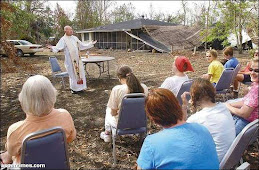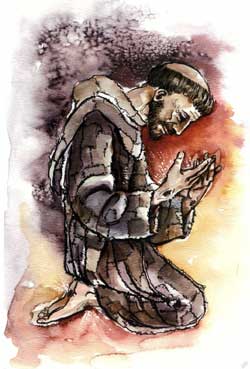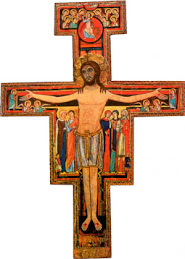Are you a convert to the Catholic faith? If so, perhaps you can relate to the title of this post. I invite your comments and would love to hear from you. The title quote is from the writings of G. K. Chesterton. My husband and I are converts. Every time we read Chesterton's comments on conversion to the Catholic Church, we laugh and look at each other knowingly, telling some of the stories again of our journey into the Church. We read the poem and are filled with thanksgiving and praise. Our name is Lazarus and we live.
G. K. Chesterton (1874-1936) was an English author. He was one of the most well-known and beloved writers of his time. He was also a convert to the Catholic faith. When asked why he became a Catholic, he replied (in Autobiography), "To get rid of my sins."
Chesterton also wrote a longer answer in his book, The Catholic Church and Conversion. Converts and cradle Catholics will find this book both enlightening and entertaining. Chesterton wrote with great insight and marvelous wit. Many converts will smile knowingly when reading his statement, "I had no more idea of becoming a Catholic than of becoming a cannibal."
In describing the conversion process in The Catholic Church and Conversion, Chesterton said that there are three stages that a convert goes through. In the first stage, the convert imagines himself to be entirely detached or even indifferent but feels that he ought to be fair to the Church of Rome. The convert wishes to do it justice, chiefly because he sees that the Church suffers injustice.
The second stage is: "that in which the convert begins to be conscious not only of the falsehood but the truth and is enormously excited to find that there is far more of it than he would ever have expected. . . . This process, which may be called discovering the Catholic Church, is perhaps the most pleasant and straightforward part of the business, easier than joining the Catholic Church and much easier than trying to live the Catholic life. It is like discovering a new continent full of strange flowers and fantastic animals, which is at once wild and hospitable."
The third stage, according to Chesterton, is perhaps the truest and most terrible because the person is trying not to be converted but has come too near to the truth, which is like a magnet with the powers of attraction and repulsion. Describing this stage, Chesterton says that it is impossible to be just to the Catholic Church because once men cease to pull against it, they feel the tug towards it.
The moment they cease to shout it down they begin to listen to it with pleasure. The moment they try to be fair to it they begin to be fond of it. But when that affection has passed a certain point it begins to take on the tragic and menacing grandeur of a great love affair. The man has exactly the same sense of having committed or compromised himself; of having been in a sense entrapped, even if he is glad to be entrapped. But for a considerable time he is not so much glad as simply terrified.
Converts may also remember the same discovery Chesterton describes with this statement: "Only, when he has entered the Church, he finds that the Church is much larger inside than it is outside."
Chesterton was received into the Catholic Church in 1922. After receiving his first Communion, he wrote a poem called "The Convert," presented below.
THE CONVERT
After one moment when I bowed my head
I walked the ways and heard what all men said,
Forests of tongues, like autumn leaves unshed,
Being not unlovable but strange and light;
Old riddles and new creeds, not in despite
But softly, as men smile about the dead.
The sages have a hundred maps to give
That trace their crawling cosmos like a tree,
They rattle reason out through many a sieve
That stores the sand and lets the gold go free:
And all these things are less than dust to me
Because my name is Lazarus and I live.
--G. K. Chesterton--
_____________________________________________
Source for quotations from The Catholic Church and Conversion and for the poem, "The Convert": G. K. Chesterton's Works on the Web
See also: Concordia Ministries on the Why Catholic page.


















No comments:
Post a Comment